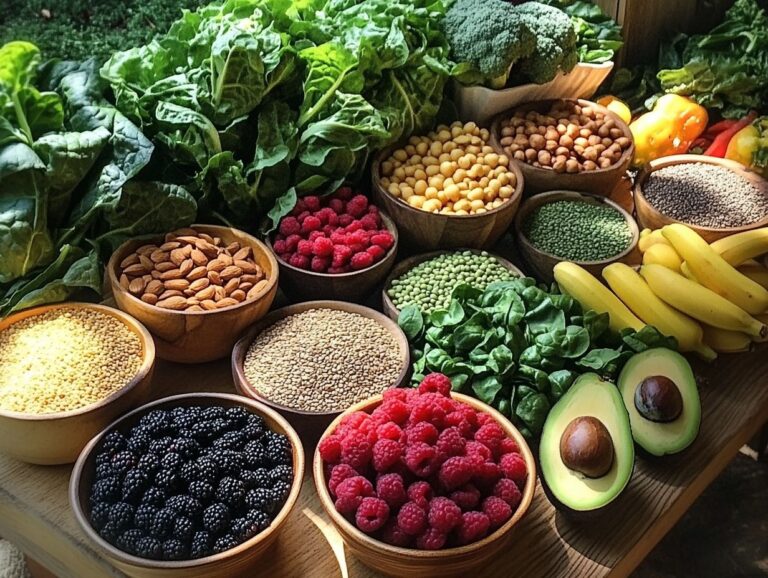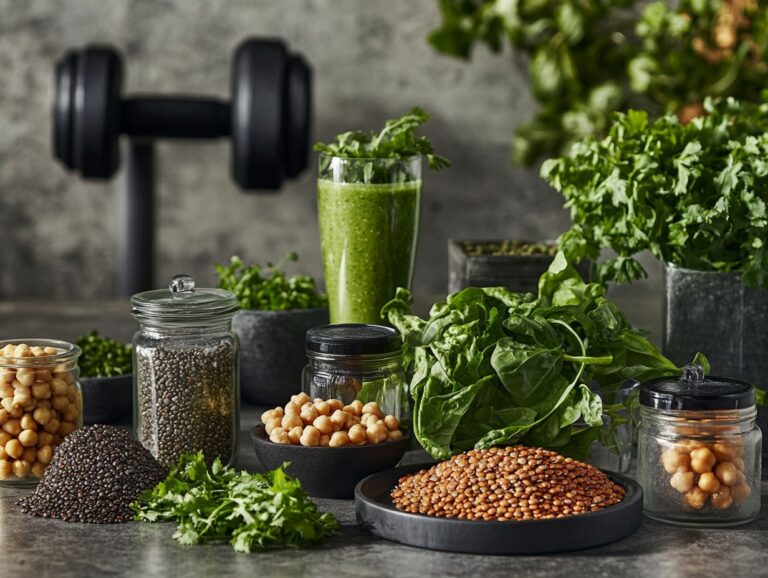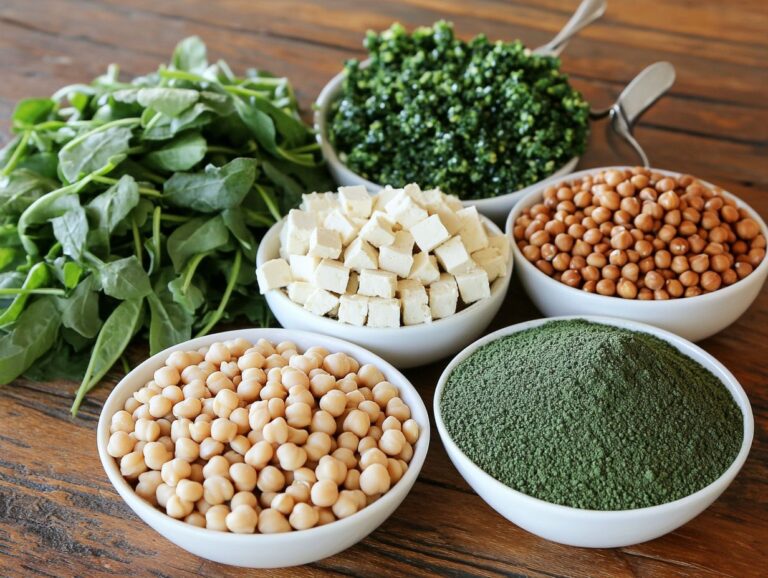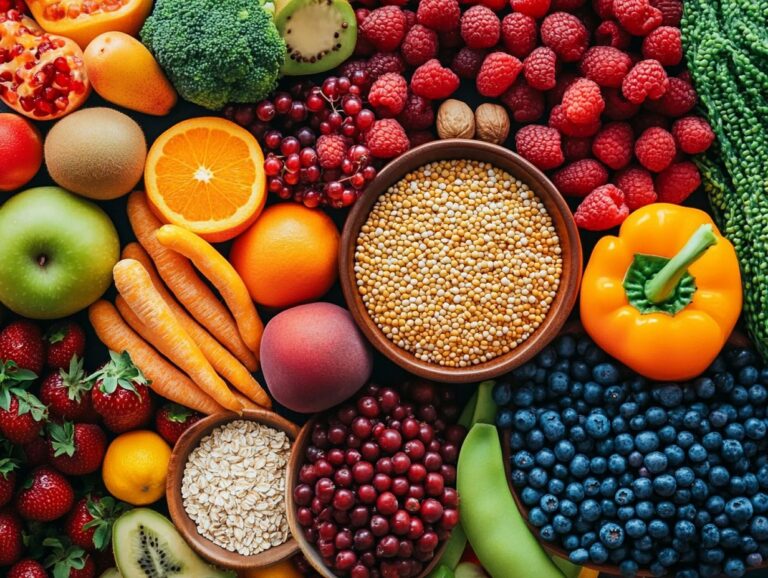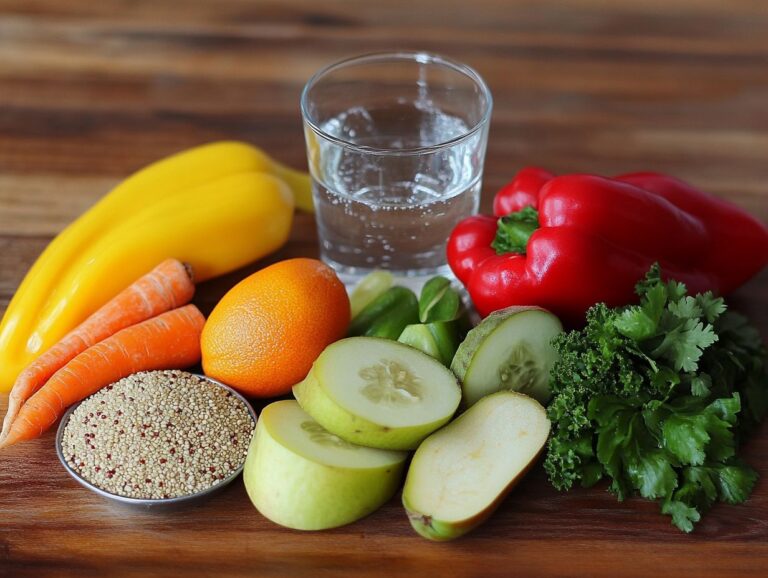A vegan diet can be a healthy and rewarding choice, offering a variety of delicious plant-based foods. If you are concerned about blood sugar levels, it is essential to understand how this diet impacts overall health. This article discusses the fundamentals of a vegan diet, its effects on blood sugar, and provides tips for maintaining healthy glucose levels. Whether you are a lifelong vegan or just beginning your journey, you can learn how to live a healthy life while embracing a vegan lifestyle.
Key Takeaways:
- Eating whole, plant-based foods is key to stabilizing blood sugar on a vegan diet.
- Including protein and healthy fats can help maintain balanced blood sugar levels.
- Limiting processed foods, added sugars, and monitoring carb intake are important for blood sugar control.
What Is a Vegan Diet?
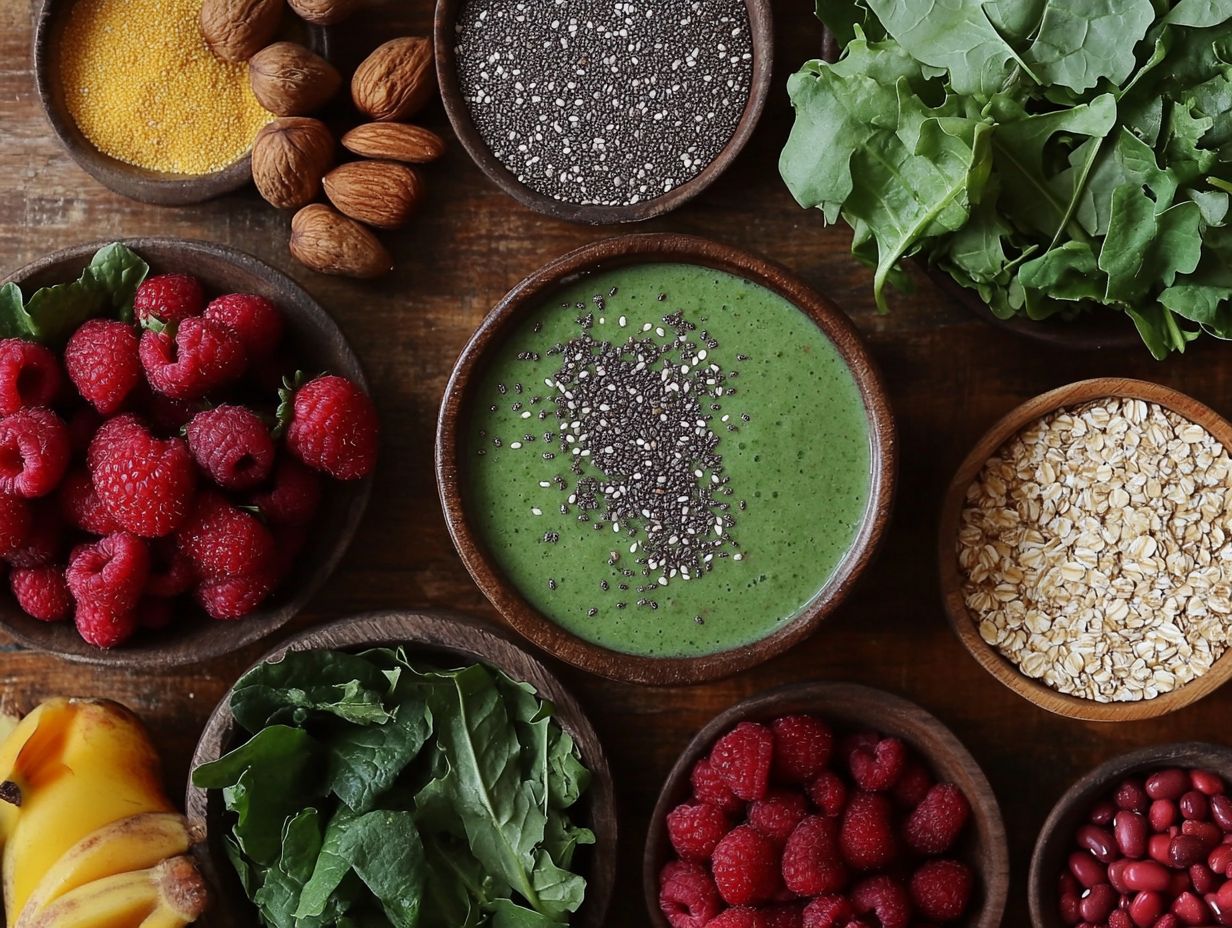 A vegan diet is a type of plant-based diet that eliminates all animal products and emphasizes whole foods, including fruits, vegetables, legumes, nuts, and seeds. These diets prioritize nutrient-dense foods that are rich in dietary fiber, healthy fats, and plant proteins. Beyond being ethical, vegan diets also provide numerous benefits for physical health. By avoiding refined carbohydrates and added sugars, a vegan diet can significantly enhance overall wellness and longevity. Additionally, it has been associated with positive health effects, such as improved blood glucose levels and heightened insulin sensitivity.
A vegan diet is a type of plant-based diet that eliminates all animal products and emphasizes whole foods, including fruits, vegetables, legumes, nuts, and seeds. These diets prioritize nutrient-dense foods that are rich in dietary fiber, healthy fats, and plant proteins. Beyond being ethical, vegan diets also provide numerous benefits for physical health. By avoiding refined carbohydrates and added sugars, a vegan diet can significantly enhance overall wellness and longevity. Additionally, it has been associated with positive health effects, such as improved blood glucose levels and heightened insulin sensitivity.
What Foods Are Included in a Vegan Diet?
A vegan diet includes a diverse array of foods, such as fruits, vegetables, legumes, whole grains, nuts, and seeds, which help individuals meet their nutritional needs. These foods provide essential vitamins and minerals, along with numerous health benefits. For instance, legumes like lentils and chickpeas are excellent sources of high-quality protein and dietary fiber, aiding in proper digestive function and helping to control hunger. Whole grains, such as quinoa and brown rice, deliver important carbohydrates that can sustain energy levels throughout the day. Nuts and seeds are significant sources of healthy fats, promoting cardiovascular health and supplying the body with essential fatty acids. By including a wide variety of these whole foods, individuals can ensure they receive a broad spectrum of nutrients, ultimately fostering better overall health.
What Are the Health Benefits of a Vegan Diet?
The health benefits of a vegan diet include improved metabolic health, better blood sugar control, and a reduced risk of chronic diseases such as diabetes and metabolic syndrome. Individuals who switch to a vegan diet often experience higher insulin sensitivity, which is crucial for regulating blood sugar levels. A diet rich in whole plant foods offers greater amounts of dietary fiber and antioxidants, both of which contribute to overall physical well-being. These nutrients play a key role in preventing chronic diseases by reducing inflammation and oxidative stress throughout the body. Research consistently demonstrates that adopting a vegan lifestyle leads to lower cholesterol levels and improved blood pressure, making it an effective approach for those seeking to enhance their long-term health.
How Does a Vegan Diet Affect Blood Sugar Levels?
A vegan diet can positively influence blood sugar levels by promoting stability and enhancing insulin sensitivity. This is largely due to the diet’s focus on nutrient-dense foods that are rich in carbohydrates, low in added sugars, and high in dietary fiber.
Does a Vegan Diet Help Stabilize Blood Sugar?
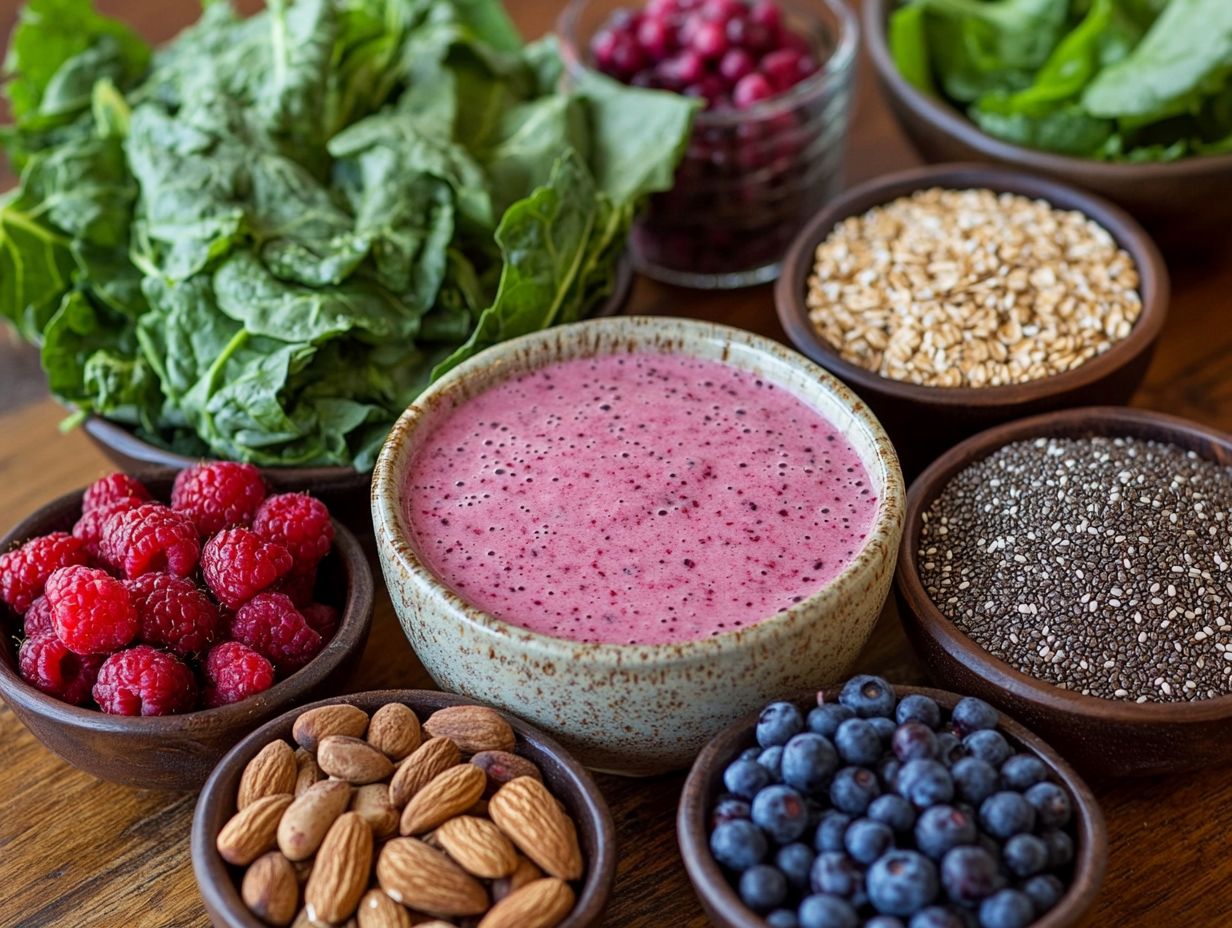 Yes, a vegan diet can help stabilize blood sugar levels, primarily due to the whole foods it includes, which promote balanced absorption and reduce the likelihood of sugar spikes. This diet typically consists of a diverse array of high-fiber foods such as fruits, vegetables, legumes, and whole grains, all of which encourage slower digestion and a more gradual release of glucose into the bloodstream. Furthermore, the absence of processed foods and added sugars decreases the chances of abrupt fluctuations in blood sugar levels. For those seeking more precise control, glucose monitoring can be an effective tool, allowing individuals to observe how their bodies respond to different foods and maintain stable levels over time.
Yes, a vegan diet can help stabilize blood sugar levels, primarily due to the whole foods it includes, which promote balanced absorption and reduce the likelihood of sugar spikes. This diet typically consists of a diverse array of high-fiber foods such as fruits, vegetables, legumes, and whole grains, all of which encourage slower digestion and a more gradual release of glucose into the bloodstream. Furthermore, the absence of processed foods and added sugars decreases the chances of abrupt fluctuations in blood sugar levels. For those seeking more precise control, glucose monitoring can be an effective tool, allowing individuals to observe how their bodies respond to different foods and maintain stable levels over time.
What Are the Risks of a Vegan Diet for Blood Sugar Control?
A vegan diet is generally beneficial for blood sugar control; however, it does come with potential risks, such as inadequate nutrient intake or an over-dependence on refined carbohydrates and processed foods. These factors can contribute to insulin resistance and poor blood sugar management. Therefore, it is crucial for individuals following a vegan lifestyle to be mindful and prioritize nutrient-dense foods over those with low nutritional value. It is a common misconception that a vegan diet automatically equals a healthy diet, but this is not necessarily true. For instance, regularly consuming sugary foods and highly processed vegan substitutes can significantly elevate blood sugar levels. Instead, individuals should focus on creating balanced meals that include:
- Whole grains
- Legumes
- Healthy fats
- A diverse array of fruits and vegetables
A diet rich in essential vitamins and minerals while minimizing processed foods can greatly enhance blood sugar control.
Tips for Stabilizing Blood Sugar on a Vegan Diet
The most effective way to stabilize blood sugar on a vegan diet is to consume healthy meals that consist of a variety of whole, nutrient-dense foods rich in dietary fiber and antioxidants. It is also important to be mindful of dietary choices, which include maintaining caloric intake and nutritional value, and to include healthy snacks between meals to support stable blood glucose.
1. Focus on Whole, Plant-Based Foods
Whole, plant-based foods are ideal for maintaining stable blood sugar levels because they are typically rich in dietary fiber and low in added sugars, both of which contribute to effective blood sugar control and enhanced insulin sensitivity. A well-rounded vegan diet consisting of whole foods promotes not only blood sugar stability but also overall health and wellness, supporting a healthy lifestyle. For instance, legumes such as lentils and chickpeas are excellent sources of protein and fiber, which help regulate sugar absorption. Whole grains like quinoa, oats, and brown rice are nutrient-dense foods that maintain energy levels without causing significant spikes in blood glucose. Fruits and vegetables, including berries, leafy greens, and sweet potatoes, provide essential vitamins, antioxidants, and minerals such as magnesium, along with complex carbohydrates that support blood sugar management and glucose regulation. Incorporating these foods is crucial for individuals looking to enhance their diets, meet their nutrient requirements, and achieve long-lasting health benefits.
2. Incorporate Protein and Healthy Fats
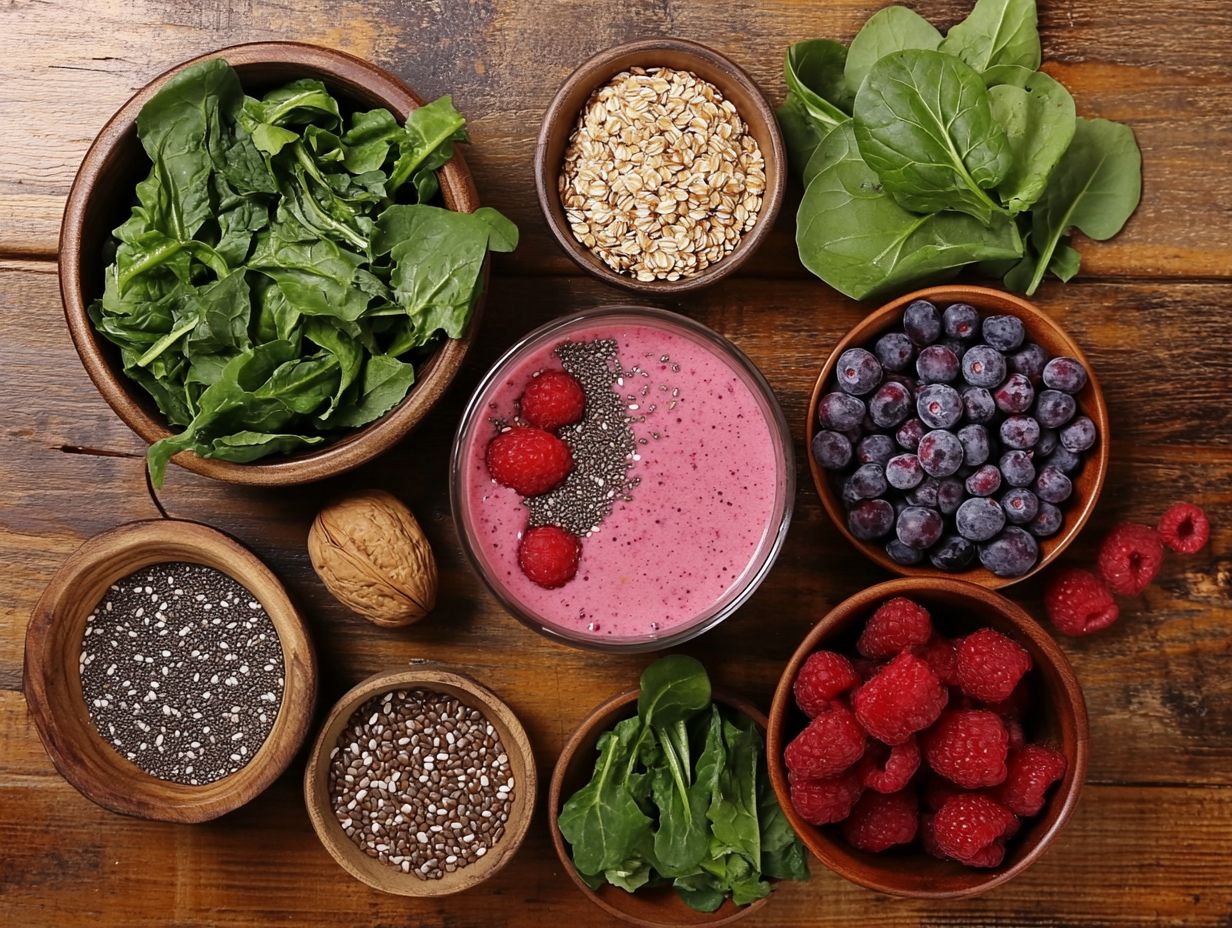 A vegan diet that includes adequate protein and healthy fats can assist in blood sugar control and help individuals feel energized throughout the day. These nutrients promote a sense of satiety, which can aid in weight management and help prevent energy dips. For instance, legumes such as lentils and chickpeas are excellent sources of plant-based protein and dietary fiber, while nuts, seeds, and avocados provide healthy fats essential for hormone function and overall health. Additionally, quinoa and almonds not only enhance meal diversity but also contribute to maintaining balanced blood sugar levels due to their low glycemic index and carbohydrate-rich nature.
A vegan diet that includes adequate protein and healthy fats can assist in blood sugar control and help individuals feel energized throughout the day. These nutrients promote a sense of satiety, which can aid in weight management and help prevent energy dips. For instance, legumes such as lentils and chickpeas are excellent sources of plant-based protein and dietary fiber, while nuts, seeds, and avocados provide healthy fats essential for hormone function and overall health. Additionally, quinoa and almonds not only enhance meal diversity but also contribute to maintaining balanced blood sugar levels due to their low glycemic index and carbohydrate-rich nature.
3. Limit Processed Foods and Added Sugars
To maintain blood sugar control on a vegan diet, it is essential to avoid processed foods and added sugars, which can lead to frequent sugar spikes and crashes in blood glucose levels. These rapid fluctuations can result in feelings of fatigue and irritability, making it difficult to concentrate or perform everyday tasks. To prevent the complexities of a vegan lifestyle from negatively impacting blood sugar control and insulin function, carefully reading food labels is crucial to identify hidden sugars that may be present in processed foods. These hidden sugars can appear under various names, such as agave nectar or high-fructose corn syrup. Instead, focusing on whole, unprocessed foods such as legumes, whole grains, nutrient-dense fruits, and vegetables can help maintain steady blood sugar levels. When meals are prepared at home, it becomes easier to control the ingredients, ensuring they are both nutritious and comforting while avoiding the adverse effects associated with processed foods.
4. Monitor Carbohydrate Intake
Monitoring carbohydrate intake is crucial in a vegan diet because carbohydrates significantly affect blood sugar levels and overall glucose regulation. Understanding the different types of carbohydrates can greatly influence one’s dietary well-being. High-fiber foods, typically found in whole grains, fruits, and vegetables, slow glucose absorption and contribute to more stable blood sugar levels. In contrast, refined carbohydrates found in processed foods can cause rapid spikes in blood sugar, leading to energy crashes, increased cravings, and symptoms management challenges. Therefore, effective glucose monitoring not only provides real-time insight into how the body responds to different carbohydrates but also equips individuals with the knowledge to make better dietary choices that promote stable energy levels and overall health.
5. Stay Hydrated
An important aspect of blood sugar control on a vegan diet is staying hydrated. Proper hydration supports various bodily functions, including glucose metabolism and energy release. When the body is adequately hydrated, it can regulate insulin and glucose levels more effectively, facilitating the transport of glucose into cells and preventing spikes in blood sugar. This balance is crucial for individuals managing diabetes as well as for anyone looking to maintain energy levels, stable blood sugar, and optimal health through a healthy lifestyle. To promote adequate fluid intake on a vegan diet, one can consume hydrating foods such as nutrient-dense foods with high water content:
- Cucumbers
- Watermelon, rich in antioxidants
- Leafy greens
Additionally, keeping a reusable water bottle nearby can serve as a reminder to take small sips throughout the day, helping to establish a healthy habit that benefits overall well-being.
6. Exercise Regularly
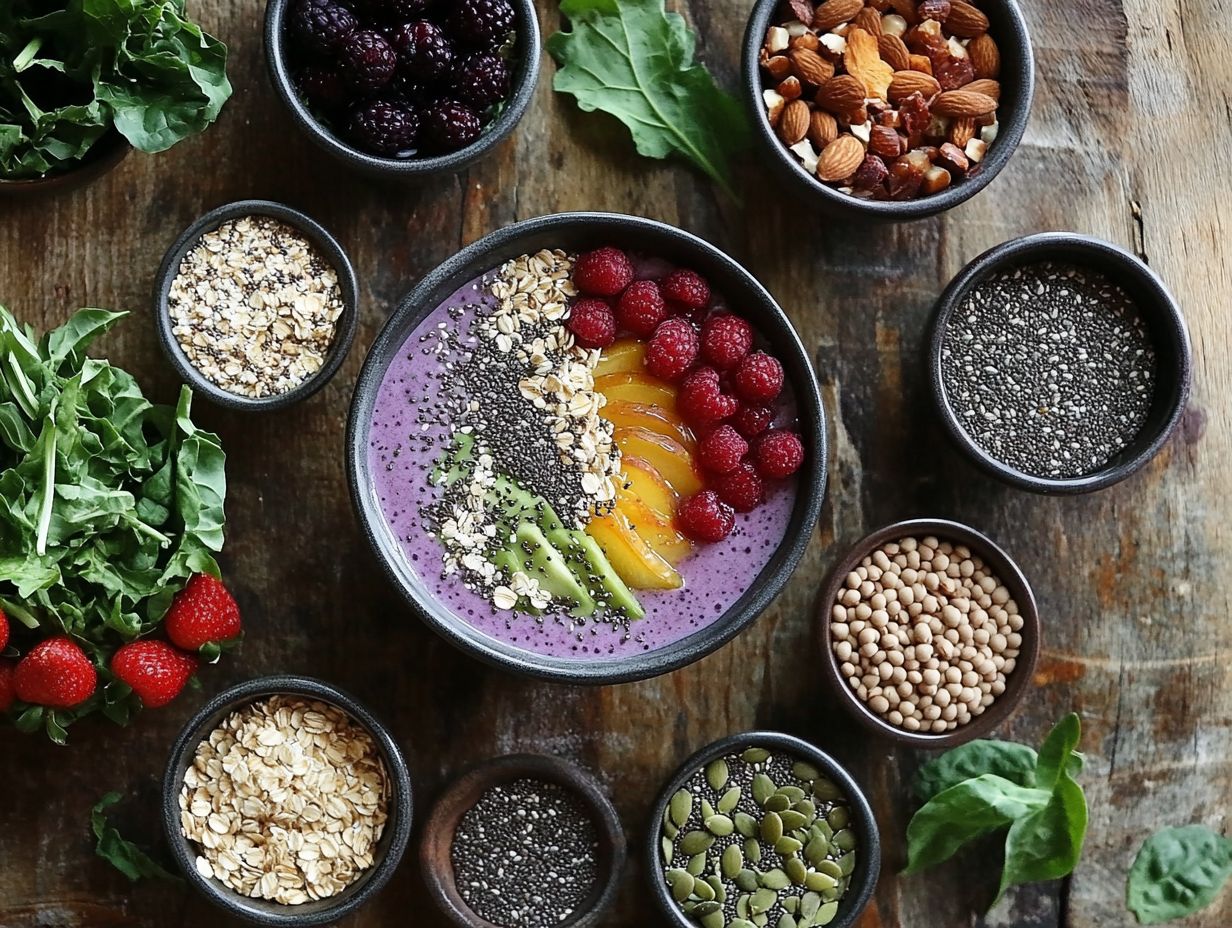 Regular exercise plays a crucial role in blood sugar control for individuals following a vegan diet, as it enhances insulin sensitivity and promotes overall physical health. While regular physical activity is essential for managing blood glucose levels, effective weight management is also vital for optimal metabolic function. For those on a vegan diet, aerobic exercises, strength training, and high-intensity interval training can be particularly beneficial. Aerobic activities such as running, cycling, and swimming not only improve cardiovascular health but also facilitate better glucose uptake by muscles. Additionally, strength training using bodyweight exercises or resistance bands helps build muscle, which can enhance insulin sensitivity over time. Together, these forms of exercise provide an effective approach to improving overall health and achieving better blood sugar control.
Regular exercise plays a crucial role in blood sugar control for individuals following a vegan diet, as it enhances insulin sensitivity and promotes overall physical health. While regular physical activity is essential for managing blood glucose levels, effective weight management is also vital for optimal metabolic function. For those on a vegan diet, aerobic exercises, strength training, and high-intensity interval training can be particularly beneficial. Aerobic activities such as running, cycling, and swimming not only improve cardiovascular health but also facilitate better glucose uptake by muscles. Additionally, strength training using bodyweight exercises or resistance bands helps build muscle, which can enhance insulin sensitivity over time. Together, these forms of exercise provide an effective approach to improving overall health and achieving better blood sugar control.
Other Factors That Affect Blood Sugar on a Plant-Based Diet
Several non-dietary factors can significantly influence blood sugar levels on a vegan diet. These factors include medications, stress management, and sleep patterns, all of which can affect insulin resistance and glucose regulation.
1. Medications
Certain medications can affect blood sugar levels, making it important for individuals on a vegan diet to ensure their medications do not negatively impact insulin sensitivity. For instance, common medications that may raise blood sugar levels include:
- Corticosteroids
- Certain diuretics
While metformin is a drug known to help lower blood sugar levels, individuals should be aware of refined carbohydrates and added sugars. Those who follow a vegan lifestyle should consider these interactions not only for effective health management but also to maintain a balanced diet rich in whole grains, legumes, fruits, vegetables, and healthy fats. By selecting appropriate foods, individuals on a vegan diet can mitigate the effects of their medications on blood glucose levels. This underscores the importance of closely monitoring both dietary choices and pharmacological interventions, ensuring they meet nutrient requirements and maintain proper glucose monitoring.
2. Stress
Stress can lead to increased insulin resistance and poor blood sugar control, making it essential for individuals on a vegan diet to pay close attention to their stress levels. Stress hormones, such as cortisol, can prompt the liver to release more glucose into the bloodstream, resulting in elevated blood glucose levels. Therefore, those following a plant-based diet should be particularly mindful of their stress levels. Practices such as mindfulness meditation, regular exercise, and maintaining a well-balanced diet have been shown to effectively reduce stress. Additionally, stress-relieving techniques like yoga or deep breathing can promote relaxation and enhance insulin sensitivity, contributing to better blood glucose control and a reduction in sugar spikes. By supporting one another and prioritizing mental health, individuals can create an environment that values both emotional and physical well-being.
3. Sleep Patterns
Sleep patterns play a crucial role in regulating blood sugar levels, and inadequate sleep can adversely affect insulin function and overall glucose metabolism. The quality of sleep influences how rested a person feels and how effectively glucose is processed in the body. Insufficient or poor-quality sleep can lead to increased insulin resistance, making it challenging to maintain stable blood sugar levels. For individuals following a vegan diet, improving sleep hygiene can further enhance health outcomes. Implementing better sleep hygiene practices, such as:
- Maintaining consistent sleep schedules
- Establishing relaxing pre-bedtime routines
- Reducing screen time before bed
can contribute to a restful night’s sleep. Incorporating calming herbal teas like chamomile or valerian root into the pre-bedtime routine can also promote relaxation and support well-regulated blood sugar levels. This practice complements a diet rich in magnesium and other essential nutrients.
When to Seek Medical Advice
Individuals following a vegan diet should seek medical advice if they experience any persistent symptoms related to blood sugar management, as professional guidance can help them effectively manage diabetes. Common symptoms such as frequent urination, extreme thirst, fatigue, blurred vision, and unintended weight loss may indicate significant fluctuations in blood sugar levels. These symptoms may suggest that dietary adjustments are necessary to fulfill nutritional requirements while adhering to a vegan diet. Medical professionals can aid in monitoring overall health and preventing negative side effects that may arise from inadequate blood sugar control. It is essential not to underestimate the importance of medical advice, particularly concerning the complex interaction between a vegan diet and diabetes management, ensuring proper intake of plant proteins and nutrient-dense food sources.
